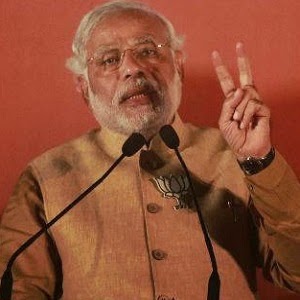By M H Ahssan | INNLIVE
EDITORIAL It is received wisdom (or is it assumption?) that the Muslim vote will go against the BJP in most places. This might well happen in some constituencies and states, but there are now good reasons to question the assumption that the Muslim vote will be cast en bloc to stop the Narendra Modi bandwagon in its tracks.
To be sure, voting against Modi, even if it were to happen, does not affect the BJP’s overall prospects, especially if the anti-Modi vote is distributed among two or more parties parties, as it could happen in Uttar Pradesh. But there are now straws in the wind indicating that the Muslim vote may not be monolithic anyway. It may not even be that enthusiastic about voting solidly against Modi.
While this trend has been apparent in Gujarat over the last two elections, it appears that Muslims in many constituencies are unenthusiastic about being pushed into the role of last line of defence for secularism. A report from Faizabad in eastern Uttar Pradesh, which includes Ayodhya town, quotes some Muslims as questioning why it was their duty to stop Modi.
In fact, they seem angry with the Samajwadi Party (SP) for allowing a series of riots to happen across Uttar Pradesh, and some of them are thinking of either voting for the BJP (to seek a form of political protection) or opt for the Peace Party of India, a Muslim party that made its debut some years ago.
The report quotes a Muslim resident of Faizabad, Mohammed Arif, who was a victim of one such recent riot and has recently received compensation from the state government for his ruined shop, as saying: “Will I vote for the SP? Never. We voted them to power and were rewarded with riots across UP. They gave us compensation but my shop was more valuable then.” Arif does not see defeating the BJP as his main goal, and says votes could either go to the BJP or the Peace Party. “Why is defeating the BJP or Modi our responsibility?” he asks, not unreasonably.
This response, or course, varies from district to district and state to state. In Bihar, for example, Muslims are keen to vote against the BJP, but they seem to be dumping Nitish Kumar, who sacrificed his alliance with the BJP to woo the Muslim vote. In Bihar, the Muslim vote seems to be consolidating behind Lalu Prasad’s Rashtriya Janata Dal, which is allied to the Congress.
Reason: unlike the Samajwadi Party, Muslims believe that Lalu Prasad did not sell their interests down the river, as report suggests. A subscription-driven election analysis site run by Praveen Patil, has found that the Muslim vote is nowhere as enthusiastic about defeating Modi as one would have imagined. The website, which offers early trends in voting behaviour, took two sample constituencies – one in the north and one in the south – where Muslim politics is dominant, and found that the voter was essentially disenchanted.
The two constituencies sampled were Gulbarga in northern Karnataka and Rampur in Uttar Pradesh, which is Samajwadi Party strongman Azam Khan’s bailiwick. In both constituencies, Muslims rock the final vote. The findings are stunning: in Rampur, it found the Muslim vote vertically split between the Samajwadi Party and the Congress, which gives the BJP a chance in this Muslim-dominated constituency which also has a significant non-Muslim vote. In Gulbarga, where too the Muslim vote – though lower than in Rampur – tends to pick the winning side, found that there was a very strong Modi vote among non-Muslims and a low voter turnout among Muslims.
On polling day in Karnataka (17 April), turnout in the Muslim segments of Gulbarga was far below the constituency average. The Gulbarga North assembly segment with 70 percent Muslim voters apparently saw only a 52 percent turnout, much lower than the overall average of 58 percent. This means polling in the segments outside Muslim-dominated areas was much higher than in the Muslim areas. Neither Gulbarga nor Rampur has ever voted for the BJP since 1998.
Will it be different this time due to Muslim disengagement? The website believes there is a large degree of Hindu enthusiasm for voting, but relative disenchantment among Muslims. While one cannot vouch for the authenticity of the website’s data, its observations, even if only partially true, raise intriguing possibilities about which way the Muslim vote is going.
The answer is likely to be that Muslims in different pockets may vote differently, depending on local conditions. If this is what we discover on 16 May, it will mean that the Muslim vote is not a monolith anymore – even with Modi in the fray.


No comments:
Post a Comment